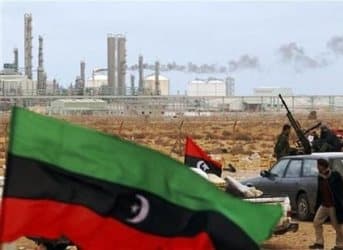The self-declared government of Cyrenaica, a district in eastern Libya, said it established its own oil company that's ready to put crude oil on the international market. Libya since Moammar Gadhafi's dictatorship ended in 2011 has struggled to return to the level of stability he ensured with an iron fist. Now, one of Africa's leading oil states is tearing apart at the seams defined largely along the divisions suppressed during Gadhafi's autocracy. With 48 billion barrels of proven oil reserves at stake, what's next for Libya may have less to do with political reform than it does with who controls the oil spigots.
Tribes in eastern Libya have pressed for a return to an administrative system established in the 1950s. Then, Libya was divided into three states, with Cyrenaica spread out over much of the eastern half of the country. That all ended when Gadhafi took power in a 1969 coup d'état. Abd-Rabbo al-Barassi, leader of the revised eastern administration, said the new company would be set up in Tobruk, where protesters last week laid siege to the Hariga port. That protest left a tanker set to load 60,000 barrels of crude oil for Italy stranded offshore.
Seemingly waning in power, and just weeks removed from his kidnapping, Libyan Prime Minister Ali Zeidan said the central government in Tripoli might run short on money because of oil export woes. The eastern area is home to several key oil fields and export terminals, meaning Zeidan has little say over what happens there. He said 60 percent of the oil production in Libya has stopped because of a series of disruptions, and most of that is from the eastern region. In the next month or so, he said, the Libyan economy may be in a bit of a pickle.
Related article: Libya: Benghazi Burns as Clashes Intensify in Tripoli
Six short months ago, the International Monetary Fund struck an optimistic tone about Libya's post-war economic prospects. Inflation in 2012 slowed to 6 percent, the country showed "strong" economic recovery that year and its non-hydrocarbon sector was expected to grow by an average 15 percent during the next five years. Short term, however, the government may be unable to manage its own political transition effectively, Libya's security situation is in dire straits and institutional constraints are "severe," the IMF cautioned. Across the board, the organization warned that Libya's post-war prospects may be too dependent on oil.
Zeidan last weekend called on the Libyan people to take to the streets to press for the nation's oil fields to re-open. Production is down to about 250,000 barrels per day, a far cry from the pre-civil war level of about 1.6 million bpd. He said protesters had less than two weeks to end their campaign at Libya's key eastern terminals or face the consequences. In October, the prime minister was captured by one group of bandits only to be later freed by another. The kidnapping highlights just how little authority the central government has since Gadhafi's death in 2011. Zeidan has said he wouldn’t use force in an effort to exert his authority. Now, the prime minister warned he may be ready to take action.
"We will not announce [the action], but you will know when it is implemented," he said.
By. Daniel J. Graeber of Oilprice.com

















